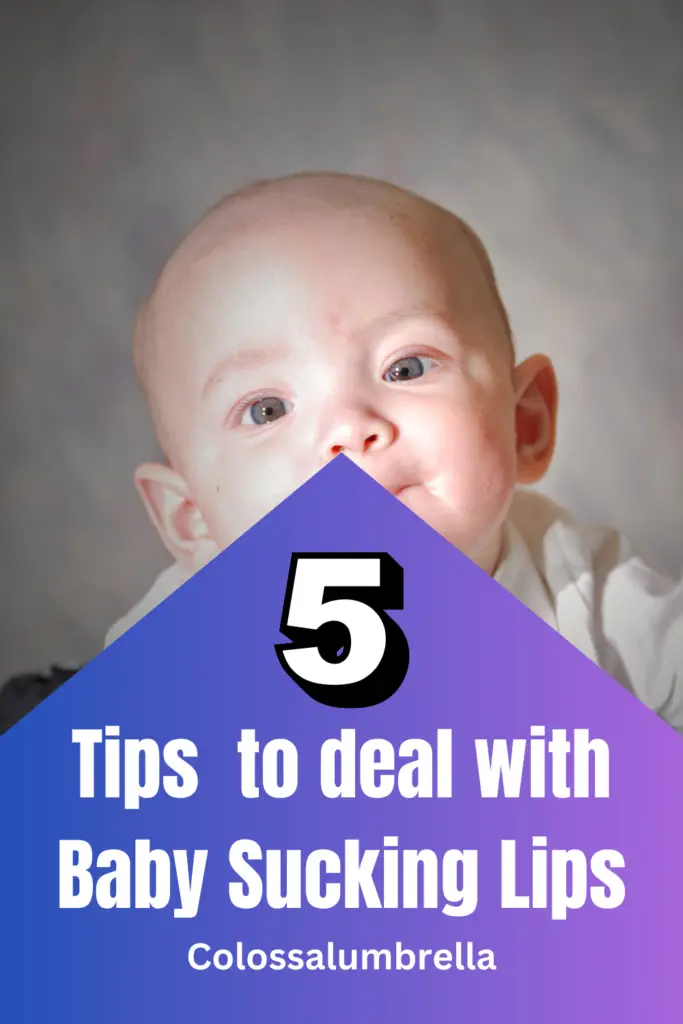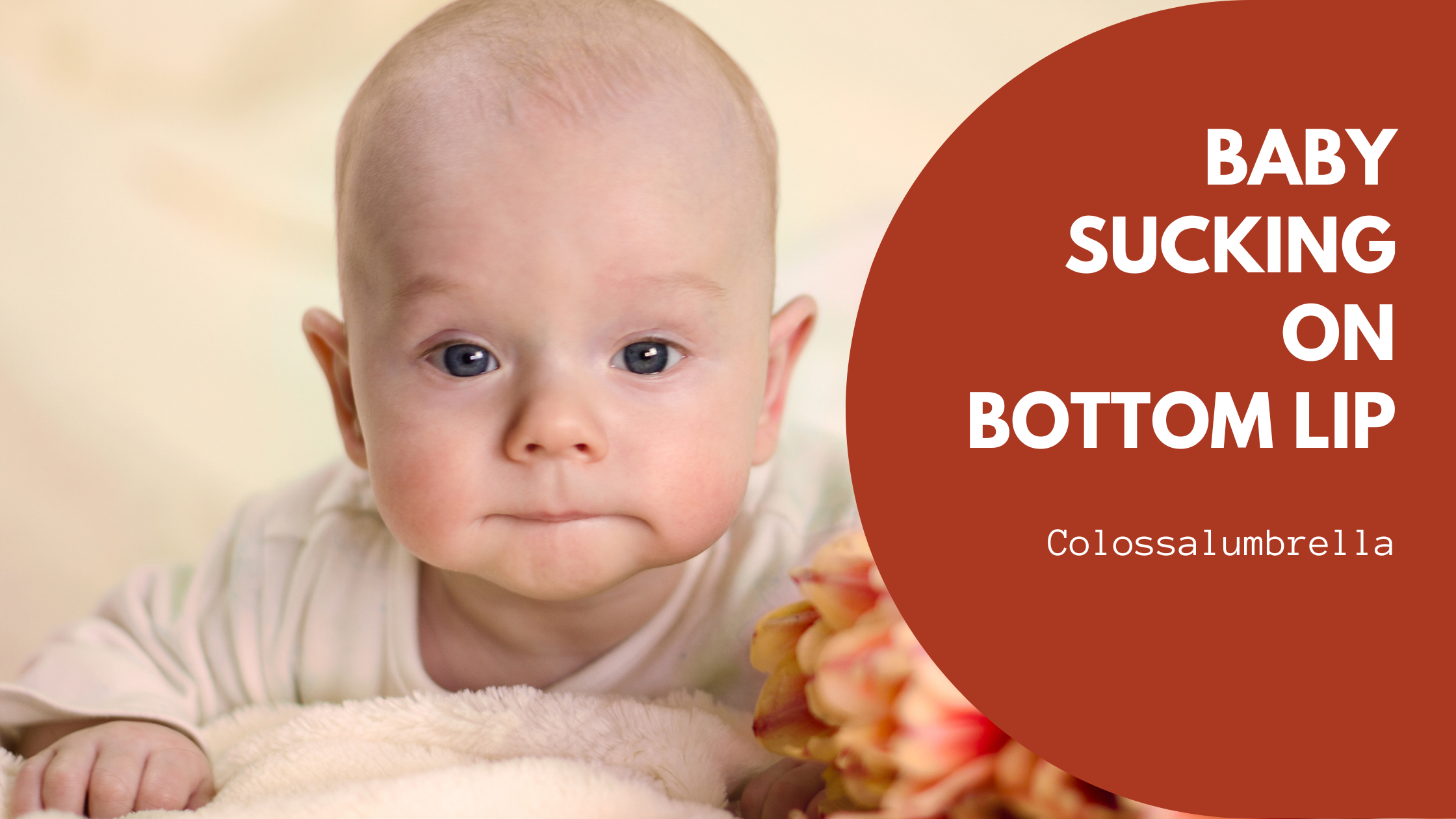Contents
As a new parent, it’s natural to observe and analyze every little behavior your baby exhibits. It’s like becoming a detective, but instead of solving crimes, you’re deciphering the mysterious behaviors of your adorable little suspect. And one such behavior that might leave you scratching your head is the infamous baby bottom lip sucking. It’s a sight that can simultaneously melt your heart and make you question whether your baby is secretly auditioning for a lip-sucking championship.
In this comprehensive guide, we’re going to dive deep into the realm of baby bottom lip sucking. We’ll uncover the secrets behind this peculiar habit, address any concerns you might have, and equip you with the necessary solutions to navigate this uncharted territory of lip-related cuteness.
So, why exactly does your little bundle of joy engage in this delightful lip-sucking extravaganza? Is it normal, or should you be worried that your baby is secretly auditioning for a role in a tiny vampire movie?
Understanding the phenomenon
Before we dive into the depths of lip sucking, let’s take a moment to appreciate the uniqueness of this behavior. Picture your little one, their tiny lips forming a perfect seal around the lower lip, as if they’re preparing for a tiny kiss. It’s utterly endearing and hard to resist the urge to join in on the fun.
What Causes Baby Sucking on Bottom Lip
Babies engage in various behaviors as they explore their bodies and develop new skills. Sucking on the bottom lip is one of these behaviors, and it can have several underlying causes. Understanding these causes can provide valuable insight into why your baby engages in this behavior. Here are some common reasons:
Self-Soothing
Babies have a natural instinct to soothe themselves. Inside the womb, they often suck their thumbs or fingers for comfort. Once born, it becomes more challenging for babies to access their thumbs or fingers, leading them to find alternative ways to self-soothe. Sucking on the bottom lip can serve as a substitute for thumb-sucking or finger-sucking, providing a sense of comfort and security.
Teething
Teething is a significant milestone in a baby’s development. As their teeth begin to emerge, babies may experience discomfort and soreness in their gums. To alleviate this discomfort, they may bite or suck on objects, including their bottom lip. Teething rings, chilled fruits, and other teething remedies can help provide relief and reduce the need for lip-sucking.
Hunger or Food Curiosity
Babies are naturally curious about the world around them, including the food their parents eat. When they see you eating, they may mimic the action by biting, sucking, and smacking their lips. This behavior can indicate their interest in trying solid foods. If your baby is ready for solid foods, consider introducing age-appropriate purees or soft foods to satisfy their curiosity.
Exploration and Sensory Development
Babies explore the world through their senses, and their lips are no exception. Sucking on their bottom lip can be a way for them to understand their body and the sensations it provides. It can also be a part of their sensory developmental milestones, as they learn about different textures and movements
Is Baby Sucking on Bottom Lip Normal?
Rest assured, baby lip-sucking is generally considered normal and not a cause for concern. It is a common behavior exhibited by many infants as they navigate the early stages of their development. Most babies outgrow this behavior on their own as they become more adept at self-soothing and exploring other ways to engage with their environment.
When to Be Concerned About Baby Sucking on Bottom Lip
While baby lip-sucking is typically harmless, there are instances where it may warrant further attention. Here are a few situations to consider:
Persistent Lip-Sucking Beyond 1 Year
If your baby continues to suck on their bottom lip beyond the age of one year, it may be worth discussing with their pediatrician. Prolonged and persistent lip-sucking could indicate an underlying issue that requires professional evaluation. The pediatrician can assess the situation and provide guidance on how to address the behavior if necessary.
Physical Symptoms or Injuries
In some cases, excessive lip-sucking can lead to physical symptoms such as chapped lips, blisters, or even bruises. If you notice any signs of irritation or injury on your baby’s lip, it’s important to address the issue. Applying a baby-safe lip balm or coconut oil can help soothe minor lip irritation. However, if the symptoms persist or worsen, consult with your pediatrician for further advice.
Speech and Dental Development Concerns
Extended and intense lip-sucking may have implications for speech and dental development. Children who engage in prolonged thumb-sucking or lip-sucking may experience dental issues, such as malocclusion (abnormal alignment of teeth) or speech problems. If you suspect that your child’s lip-sucking behavior is negatively impacting their oral health or speech development, consult with a pediatric dentist or speech therapist for appropriate interventions
Tips for parents to deal with Baby Sucking on Bottom Lip
In most cases, baby lip-sucking is a temporary behavior that resolves naturally over time. However, if you feel the need to address the behavior, here are some strategies you can try:

Provide Alternative Soothing Methods
Since lip-sucking is often a form of self-soothing, it can be helpful to introduce alternative soothing techniques. Offer your baby a pacifier or a soft toy to suck on, redirecting their attention away from their bottom lip. These alternatives can provide comfort and help them develop new self-soothing habits.
Maintain a Consistent Feeding Schedule
If your baby’s lip-sucking behavior seems to be related to hunger, ensure that you maintain a consistent feeding schedule. By providing regular and adequate feedings, you can reduce the likelihood of lip-sucking as a signal of hunger. Observe your baby’s feeding patterns and adjust the schedule accordingly to meet their needs.
Introduce Age-Appropriate Solid Foods
If your baby’s lip-sucking behavior arises from curiosity about food, consider introducing age-appropriate solid foods. Consult with your pediatrician to determine when it is appropriate to start introducing solids and which foods are safe for your baby. By satisfying their curiosity and allowing them to explore new tastes and textures, you may reduce their inclination to suck on their bottom lip.
Distraction and Engaging Activities
Engaging your baby in stimulating activities can divert their attention away from lip-sucking. Take them outdoors for a walk, play with them using age-appropriate toys, or read to them. Providing a variety of engaging experiences can help redirect their focus and encourage the development of new interests and behaviors
When to consult a pediatrician
While lip sucking is generally a harmless behavior, there are instances where seeking professional advice is warranted. Pay attention to any unusual changes in your baby’s lip appearance, such as discoloration, swelling, or sores. These could be signs of an underlying issue that requires medical attention.
Consistent lip sucking beyond infancy, especially when it begins to interfere with normal activities like eating or speaking, should also be discussed with your pediatrician. They can assess your baby’s overall development and offer guidance specific to their needs.
People Also Ask
How do I get my child to stop biting his lower lip?
Encouraging alternative self-soothing techniques such as offering teething toys, redirecting their attention to other activities, and creating a soothing environment can help discourage lip biting behavior.
Is biting your lip a symptom?
Biting the lip can be a symptom of various conditions, such as anxiety, stress, or even certain neurological disorders. If lip biting becomes excessive or causes injury, it’s advisable to consult with a healthcare professional for a proper evaluation.
Why does my baby tuck in their bottom lip?
Babies might tuck in their bottom lip as a form of self-soothing or exploring different mouth sensations. It could also be an adorable quirk that varies from baby to baby.
Why does a newborn’s bottom lip quiver?
A quivering or trembling bottom lip in newborns is usually a normal reflex. It can occur due to an immature nervous system and typically resolves on its own as the baby’s neurological development progresses.
What is a lip issue for a newborn?
Lip issues in newborns can include conditions like a lip tie, where the upper lip is attached too tightly to the gums. This can affect breastfeeding and may require evaluation and treatment by a healthcare professional.
Conclusion
Baby bottom lip sucking is a fascinating behavior that can leave new parents both amused and puzzled. Through our journey of exploration, we’ve uncovered the underlying causes, addressed potential concerns, and provided practical solutions to navigate this adorable phenomenon.
Remember, as a new parent, it’s only natural to analyze and question every little quirk your baby displays. Lip sucking is a normal part of their development, often serving as a self-soothing mechanism and a way to explore new sensations. It’s a reflection of their individuality and unique path of growth.
However, it’s important to strike a balance between embracing their adorable lip-sucking antics and being mindful of potential concerns. Excessive lip sucking or any changes in lip appearance should prompt a conversation with your pediatrician to ensure your baby’s overall well-being.
Disclaimer: The content of this blog is for informational purposes only and is not intended to be a substitute for professional medical advice, diagnosis, or treatment. Always seek the advice of your physician or other qualified healthcare providers with any questions you may have regarding a medical condition.
I would stay connected and keep you updated with parenting tips, pregnancy guides, creative ideas, easy crafts, and Free Printables. Subscribe to Colossalumbrella to get new ideas delivered to your inbox. Follow me on Facebook, Pinterest, Twitter, and Instagram.
